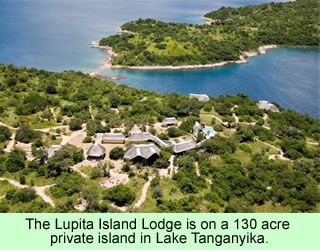A tragedy a month ago at an expensive American-owned tourist lodge on the coast of Lake Tanganyika, which resulted in the death of a pregnant Fipa woman and her fetus, is back in the news again—at least in Africa. New allegations against the lodge and the callous insensitivity of its staff reveal the depths of distrust and dislike by the local people for the facility.
 The Lupita Island Lodge—also called the Rupita, Lupila, and Rupila Island Lodge in the African press—features very large, open chalets, with no walls or doors to block the views of the lake and surrounding islands. Security for the wealthy guests who stay in the enormous villas is a major concern of the lodge owners, who have ordered their staff to release fierce dogs to attack anyone who approaches the shore or the lodge grounds. The earlier incident involved a pregnant, and very ill, woman traveling along the lakeshore in a boat who was refused permission to land and seek medical assistance. As a result, she died before she could get help. Local people reacted angrily.
The Lupita Island Lodge—also called the Rupita, Lupila, and Rupila Island Lodge in the African press—features very large, open chalets, with no walls or doors to block the views of the lake and surrounding islands. Security for the wealthy guests who stay in the enormous villas is a major concern of the lodge owners, who have ordered their staff to release fierce dogs to attack anyone who approaches the shore or the lodge grounds. The earlier incident involved a pregnant, and very ill, woman traveling along the lakeshore in a boat who was refused permission to land and seek medical assistance. As a result, she died before she could get help. Local people reacted angrily.
Last week’s news story revealed that allegations of criminal activity had been made against the lodge management. Mr. Aggrey Mwanri, Minister of State for Regional Administration and Local Government in Tanzania, directed officials in the Rukwa Region government to investigate reports that the tourist lodge is involved in the illegal trafficking of guns to the neighboring DR Congo.
Mr. Mwanri, addressing a public rally at a school in Sumbawanga, in the Rukwa Region, said that regional authorities needed to investigate what is going on in the Lupita lodge, and another foreign-owned facility on the lakeshore. He said that he had forbidden the owners of the two lodges from hampering local residents from engaging in their legitimate fishing activities or from passing near the shores of the facilities in their boats.
Ms. Stella Manyanya, the Rukwa Regional Commissioner, would not comment on the criminal allegations except to say that the charges needed to be carefully investigated. She said that her government was looking into claims that the lodge was also involved in trafficking live animals.
Ms. Manyanya was defensive about some of the other allegations made by irritated local people. Charges that boats in trouble on the lake had been hampered from landing safely on the island were unsubstantiated, she said. She was more concerned about other allegations—that personnel at the lodges were mistreating local people, and she promised to investigate.
Mr. Basilio Mbwilo, the Councilor from the Kipili ward in Nkasi District, which is part of Tanganyika’s Rukwa Region, has said that people living near the Lupita Island Lodge have asked to meet with him to discuss, in his words, “nasty experiences and insolvencies they are facing from the investors”—that is, the owners of the lodge. He also said that he plans to meet with those owners to ask why a nearby tract of land, owned by them and set aside for the construction of an airstrip, has not been developed.
Mr. Mbwilo has asked the owners to fence their property for their own safety, but he has reminded them that the law requires them to leave a strip of 60 meters (200 feet) wide to be open for public use. He indicated that the owners had been given guidelines that specify the legal conditions that affect their rights and the rights of nearby residents. The Lupita Island Lodge has built its facilities right up to the lakeshore, in the zone that legally should remain open to Tanzanian citizens.
The news story last week indicates that the Nkasi District Commissioner held a public meeting to discuss the situation. The meeting included representatives of the two lodges. That official has visited the islands in question and admitted that the government ministries had not, as yet, issued statements regarding the concerns of the area residents.